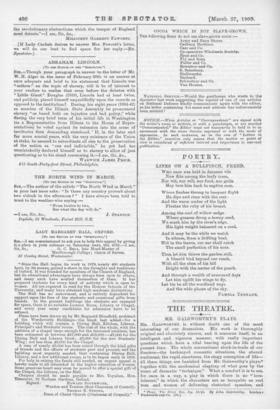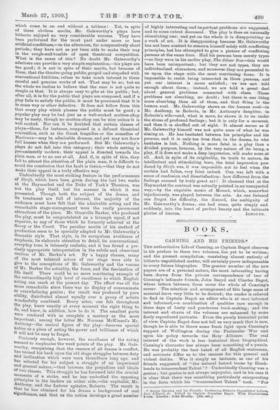THE THEATRE.
MR. GALSWORTHY'S PLAYS.
GALSWORTHY is without doubt one of the most interesting of our dramatists. His work is thoroughly original and absolutely sincere, and it concerns itself, in an intelligent and vigorous manner, with really important questions which have a vital bearing upon the life of the present time. The whole conventional stock-in-trade of our theatres—the hackneyed romantic situations, the absurd sentiment, the vapid smartness, the stagy conception of Me- an these things are banished from Mr. Galsworthy's plays,* together with the mechanical claptrap of what goes by the name of dramatic "technique." What a comfort it is to see, for once in a. way, a play in which there is no " lo ve. interest," in which the characters are as incapable as real men and women of delivering rhetorical speeches, and * Veva: The Saver Boa, Joy, Strife, By John Galawortaly. Leaden, Duckworth and Co. [Oa.]
which come to an end without a tableau! Yet, in spite of these obvious merits, Mr. Galsworthy's plays have hitherto enjoyed no very considerable success. They have been performed for the most part under more or less artificial conditions,—in the afternoon, for comparatively short periods; they have not as yet been able to make their way in the rough-and-tumble of open theatrical competition. What is the cause of this P No doubt Mr. Galsworthy's admirers can provide a very simple explanation,—his plays are teo good ; it is not in spite of their merits, but because of them, that the theatre-going public, gorged and stupefied with
conventional futilities, refuse to take much interest in these careful and genuine works of art. That may be so.; but on
the whole we incline to believe that the case is not quite so simple as that. It is always easy to gibe at the public ; but, after all, it is for the public that plays are composed, and if a play fails to satisfy the public, it must be presumed that it is in some way or other defective. It does not follow from this that every play which pleases the public must be good; a Popular play may be bad just as a. well-cooked mutton-chop may be nasty, though no mutton-chop can be nice unless it is well cooked. Nor can it be doubted that certain classes of plays—those, for instance, composed in a defunct theatrical convention, such as the Greek tragedies or the comedies of Marivaux—may be admirable dramas, and yet may not draw fun houses when they are performed. But Mr. G-alsworthy's plays do mit fall into this category; their whole setting is pre-eminently modern; their appeal is directed towards the plain man, or to no one at all. And if, in spite of this, they fail to attract the attention of the plain man, it is difficult to avoid the conclusion that the fault is theirs,—that they do not make their appeal in a truly effective way.
Undoubtedly the most striking feature in the performances of Strife, which have been given during the last two weeks
at the Haymarket and the Duke of York's Theatres, was not the play itself, but the manner in which it was presented. Though both the subject of the drama and its treatment are full of interest, the majority of the audience must have felt that the admirable acting and the remarkable stage-management were the really paramount attractions of the piece. Mr. Granville Barker, who produced the play, must be congratulated on a triumph equal, if not superior, to any of those which he formerly achieved at the Savoy or the Court. The peculiar merits of his method of production seem to be specially adapted to Mr. Galsworthy's dramatic style. That style, in its scrupulous avoidance of emphasis, its elaborate attention to detail, its conversational, everyday tone, is intensely realistic, and it has found a pre- cisely appropriate interpretation in the subtle and observant realism of Mr. Barker's art. By a happy chance, many of the most talented actors of our stage were able to give to the conceptions of Mr. Galswortby and the visions of Mr. Barker the actuality, the force, and the fascination of life itself. There could be no more convincing example of the extraordinarily high level of excellence to which English
acting can reach at the present day. The effect was all the more remarkable since there was no display of consummate Or overwhelming genius ; the result was produced by pure ability, distributed almost equally over a group of artists wonderfully combined. Every actor, one felt throughout the play, knew exactly at every moment the right thing to do, and knew, in addition, ho* to do it. The smallest parts 'sere rendered with as complete a mastery as the most important; among the latter Mr. Norman lIcKinuers Mr. Anthony—the central figure of the play—deserves special n. otiee as a piece of acting the power and brilliance of which it will not be easy to forget.
Curiously enough, however, the excellence of the acting seemed to emphasise the weak points of the play. Mr. Gals- worthy, recognising that the essence of all drama is conflict, has turned his back upon the old stage struggles between duty and inclination which were worn threadbare long ago, and has selected for his subject a struggle of an impersonal and general nature,—that between the prejudices and ideals of two classes. This struggle he has focussed into the crucial moments of a strike, and he has embodied the opposing Principles in the leaders on either side,—the capitalist, Mr. Anthony, and the Labour agitator, Roberts. The result is
tIlat. he has obtained for his drama a background of real significance, and that as the action develops a great number of highly interesting and important problems are suggested, and to some extent discussed. The play is thus an unusually stimulating one; and yet on the whole it is disappointing as a work of art. It is disappointing because Mr. Galswortby has not been content to concern himself solely with conflicting principles, but has attempted to give a picture of conflicting persons at the same time. Had his persons been merely types —as they were in his earlier play, The Silver Box—this would have been unimportant ; but they are not types, they are individualised characters, and moreover they are presented to us upon the stage with the most convincing force. It is impossible to resist being interested in these persons, and yet our interest is never satisfied ; we are not told enough about them ; instead, we are told a great deal about general problems connected with class These problems are absorbing, no doubt; but there is one thing more absorbing than all of them, and that thing is the human. soul. Mr. Galeworthy shows us the human -eoul--in Mr, Anthony, in Roberts, in Mr. Anthony's daughter, in Roberts's wife—and, what is more, he shows it to us under the stress of profound feelings ; but it is only for a moment, and then it is shuffled out of sight. It almost seems as if Mr. Galswortby himself was not quite sure of what he was aiming at. He has hesitated between his principles and his persons, and it is only too true that, in the drama, he who hesitates is lost. Nothing is more fatal in a play than a divided purpose, because, by the very nature of its being, s play, if it does not make a deep impression, will make none at all. And, in spite of its originality, its truth to nature, its intellectual and stimulating tone, the total impression pro, duced by Strife was, it was impossible not to feel when the curtain had fallen, very faint indeed. One was left with a sense of confusion and dissatisfaction: how different from the feelings aroused by truly great art! It chanced that at the Haymarket the contrast was actually pointed in an unexpected way,—by the exquisite music of Mozart, which, -somewhat injudiciously, was played between the acts. As one listened one forgot the difficulty, the discord, the ambiguity of Mr. Galsworthy'e drama, one had come, quite simply and. suddenly, into the heart of perfect beauty and the intimate











































 Previous page
Previous page